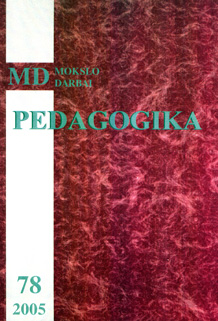Paauglių muzikos mokymosi motyvacijos veiksniai
Adolesent's Motivational Factors of the Music Learning
Author(s): Henrika Šečkuvienė, Jolanta AbramauskienėSubject(s): Education
Published by: Vytauto Didžiojo Universitetas
Summary/Abstract: The issue of the motivation of the adolescents for learning music is raised in this article. Adolescence is a significant and complex period of the development of the personality. In this age the adolescent is searching for his / her identity. Adolescence crisis often disturb the studies of the youngsters, complicate the work of the educators. The weakening learning motivation of some students is associated with the age of adolescence. Especially this tendency is strong in learning music. When searching for the reasons of the weakened motivation for learning music in adolescence age it is important to look at the studying from the positions of the student, make clear, what in opinion of the students themselves is encouraging them to learn music, and what suppresses this will. It is attempted in the research to reveal the factors, related to the student himself / herself and with the organization of the educational process. The results of the research have showed that almost all factors of learning music for majority of the students are not exceptionally important or unimportant at all. However the data of the research shows that a good music teacher is very important to more than one fourth of the students. Most of the students think that music is a useful subject at school. The analysis of the data of the research of the factors related to the student himself/ herself indicates that internal springs of the students, strengthening motivation for learning music are not strong and deeply realized. This conclusion is especially strongly based by the results achieved when studying self-esteem of the students. The results of the research revealed that the strength of the motivation for learning music depends on the sex and general interest in music. Almost one third of the girls think that pleasure which is achieved when singing, playing and listening to music is very important and only less than one tenth of the boys admit that. The results of the research have showed statistically relevant difference between the interest of the students in music and pleasure felt by performing music and satisfaction of the music classes. In conclusion it may be stated that adolescents give larger account to the motivational factors related to the organization of the process of musical education than their internal springs.
Journal: Pedagogika
- Issue Year: 2005
- Issue No: 78
- Page Range: 127-132
- Page Count: 6
- Language: Lithuanian

